|
|
Information
Service of
the Serbian Orthodox Church
July 26, 2004

BISHOP
GERASIM OF GORNJI KARLOVAC CONSECRATED
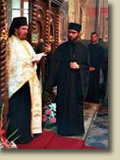 On
Saturday, July 24, 2004 the rite of election of the new Bishop
Gerasim of Gornji Karlovac took place in the Serbian Orthodox
monastery of Gomirje in the Republic of Croatia in accordance
with ancient Christian tradition. It was followed by a Vigil presided
over by His Holiness Serbian Patriarch Pavle together with Metropolitan
Jovan of Zagreb and Ljubljana; Metropolitan Amfilohije of Montenegro
and the Littoral; Metropolitan Nikolaj of Dabro-Bosnia; Metropolitan
Jovan of Veles and Povardarje, the Exarch of Ohrid; Bishop Vasilije
of Srem; Bishop Irinej of Backa; Bishop Lukijan of Osijek Polje
and Baranja; Bishop Pahomije of Vranje; Bishop Hrizostom of Bihac
and Petrovac; Bishop Jovan of Sumadija; Bishop Sava of Slavonija;
Bishop Fotije of Dalmatia; Bishop Porfirije of Jegar; Bishop Nikolaj
of Znepolje, the vicar of His Holiness Bulgarian Patriarch Maxim;
and Bishop Atanasije of Zamulje and Herzegovina (retired) with
the concelebration of the clergy, monks and nuns of the Diocese
of Gornji Karlovac. On this occasion the faithful in attendance
were addressed by Bishop Fotije of Dalmatia, who said that the
Diocese of Gornji Karlovac is a martyred diocese that has given
us martyrs, including Bishop Sava himself, who was killed while
testifying his faith with his faithful congregation. On
Saturday, July 24, 2004 the rite of election of the new Bishop
Gerasim of Gornji Karlovac took place in the Serbian Orthodox
monastery of Gomirje in the Republic of Croatia in accordance
with ancient Christian tradition. It was followed by a Vigil presided
over by His Holiness Serbian Patriarch Pavle together with Metropolitan
Jovan of Zagreb and Ljubljana; Metropolitan Amfilohije of Montenegro
and the Littoral; Metropolitan Nikolaj of Dabro-Bosnia; Metropolitan
Jovan of Veles and Povardarje, the Exarch of Ohrid; Bishop Vasilije
of Srem; Bishop Irinej of Backa; Bishop Lukijan of Osijek Polje
and Baranja; Bishop Pahomije of Vranje; Bishop Hrizostom of Bihac
and Petrovac; Bishop Jovan of Sumadija; Bishop Sava of Slavonija;
Bishop Fotije of Dalmatia; Bishop Porfirije of Jegar; Bishop Nikolaj
of Znepolje, the vicar of His Holiness Bulgarian Patriarch Maxim;
and Bishop Atanasije of Zamulje and Herzegovina (retired) with
the concelebration of the clergy, monks and nuns of the Diocese
of Gornji Karlovac. On this occasion the faithful in attendance
were addressed by Bishop Fotije of Dalmatia, who said that the
Diocese of Gornji Karlovac is a martyred diocese that has given
us martyrs, including Bishop Sava himself, who was killed while
testifying his faith with his faithful congregation.
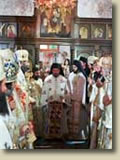 On
Sunday, July 25, 2004 after morning services several thousand
faithful gathered and Holy Hierarchal Liturgy began, presided
over by His Holiness Serbian Patriarch Pavle with the participation
of the aforementioned Hierarchs, who were also joined by Bishop
Konstantin of Central Europe, Bishop Luka of Western Europe and
Bishop Maksim of Hum. After the recital of the bishop’s confession,
the act of vestment of the new bishop (chirotonia) was performed. On
Sunday, July 25, 2004 after morning services several thousand
faithful gathered and Holy Hierarchal Liturgy began, presided
over by His Holiness Serbian Patriarch Pavle with the participation
of the aforementioned Hierarchs, who were also joined by Bishop
Konstantin of Central Europe, Bishop Luka of Western Europe and
Bishop Maksim of Hum. After the recital of the bishop’s confession,
the act of vestment of the new bishop (chirotonia) was performed.
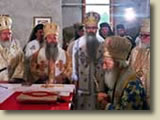 Upon
the conclusion of the Holy Liturgy, handing the miter to the new
Bishop Gerasim of Gornji Karlovac, His Holiness said: “That your
light may be sanctified before the people who upon seeing your
good deeds will celebrate your Father who is in the heavens. It
is the program for us all to serve until the end of the world
as the true light of the world. On what basis? On the basis of
our knowledge of Orthodox evangelical faith, on the basis of our
preaching of our faith by the words we speak and write but also
by our very lives. That we may testify our faith and thus preach
it even when we are silent. Upon
the conclusion of the Holy Liturgy, handing the miter to the new
Bishop Gerasim of Gornji Karlovac, His Holiness said: “That your
light may be sanctified before the people who upon seeing your
good deeds will celebrate your Father who is in the heavens. It
is the program for us all to serve until the end of the world
as the true light of the world. On what basis? On the basis of
our knowledge of Orthodox evangelical faith, on the basis of our
preaching of our faith by the words we speak and write but also
by our very lives. That we may testify our faith and thus preach
it even when we are silent.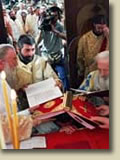 As St. Ignjatije Bogonostac said of a young Bishop that he preaches
even when he is silent, i.e. by His deeds. May this also be the
program of your faith and your life, our dear new brother in Christ.
As you become on this day a Bishop of the Orthodox Church we wish
you all that is truly good; and consequently, we give you this
miter to graze Christ’s flock entrusted to you. May it serve to
support and give strength to the obedient; teach the disobedient
and unruly, tame them by reprimand and educate them in Jesus Our
Lord Christ. Worthy!”
As St. Ignjatije Bogonostac said of a young Bishop that he preaches
even when he is silent, i.e. by His deeds. May this also be the
program of your faith and your life, our dear new brother in Christ.
As you become on this day a Bishop of the Orthodox Church we wish
you all that is truly good; and consequently, we give you this
miter to graze Christ’s flock entrusted to you. May it serve to
support and give strength to the obedient; teach the disobedient
and unruly, tame them by reprimand and educate them in Jesus Our
Lord Christ. Worthy!”
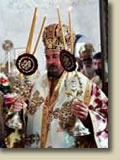 In
his sermon the newly ordained Bishop Gerasim said: “The service
of a bishop of the church of God is not easy, especially in these
times we live in when we are called upon to be the Light of the
world, the Light of the Living God, and that we invoke the greatest
of all names in our prayers, the name of the greatest pastor,
Our Lord Jesus Christ... I wish to thank Your Holiness and the
Holy Assembly of Bishops for selecting me to the high office of
the Bishop of Gornji Karlovac, and all the Hierarchs for coming
here today because your arrival is a sign of support to the faithful
of the Diocese of Gornji Karlovac.” In
his sermon the newly ordained Bishop Gerasim said: “The service
of a bishop of the church of God is not easy, especially in these
times we live in when we are called upon to be the Light of the
world, the Light of the Living God, and that we invoke the greatest
of all names in our prayers, the name of the greatest pastor,
Our Lord Jesus Christ... I wish to thank Your Holiness and the
Holy Assembly of Bishops for selecting me to the high office of
the Bishop of Gornji Karlovac, and all the Hierarchs for coming
here today because your arrival is a sign of support to the faithful
of the Diocese of Gornji Karlovac.”
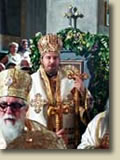 Other
senior church officials and state representatives attending Holy
Hierarchal Liturgy included the Archbishop and Metropolitan of
Rijeka, Monsignor Dr. Ivan Devcic; Monsignor Vlado Kosic, the
envoy of Josip Cardinal Bozanic and Auxiliary Bishop of Zagreb;
the Rt. Rev. Dinko Popovic, Commissioner for Ecumenism; the General
Vicar of Gostinje and Senj, Tomislav Sporcic; the parish priest
of Vrbovsko, Mate Vukovic; the Baptist pastor from Rijeka, Djordje
Grlje; Mr. Franjo Dubrovic, the Croatian Secretary for Religious
Communities; Mr. Aleksandar Tolnauer, the Chairman of the Council
for National Minorities; Croatian Parliament Deputy Dr. Milorad
Pupovac; the assistant zhupan of Primorje and Gora, Luka Denona;
the Republika Srpska Minister of Religions, Mr. Dusan Antelj;
the Republic of Serbia Minister for Diaspora, Mr. Vojislav Vukcevic;
the Assistant Minister of Culture of the Republic of Croatia,
Mr. Cedomir Visnjic; representatives of the Embassies of Serbia
and Montenegro, Greece, Russia, the United States of America,
and other cultural and public figures from the Republic of Croatia,
Serbia and Montenegro, Republika Srpska and other regions. Other
senior church officials and state representatives attending Holy
Hierarchal Liturgy included the Archbishop and Metropolitan of
Rijeka, Monsignor Dr. Ivan Devcic; Monsignor Vlado Kosic, the
envoy of Josip Cardinal Bozanic and Auxiliary Bishop of Zagreb;
the Rt. Rev. Dinko Popovic, Commissioner for Ecumenism; the General
Vicar of Gostinje and Senj, Tomislav Sporcic; the parish priest
of Vrbovsko, Mate Vukovic; the Baptist pastor from Rijeka, Djordje
Grlje; Mr. Franjo Dubrovic, the Croatian Secretary for Religious
Communities; Mr. Aleksandar Tolnauer, the Chairman of the Council
for National Minorities; Croatian Parliament Deputy Dr. Milorad
Pupovac; the assistant zhupan of Primorje and Gora, Luka Denona;
the Republika Srpska Minister of Religions, Mr. Dusan Antelj;
the Republic of Serbia Minister for Diaspora, Mr. Vojislav Vukcevic;
the Assistant Minister of Culture of the Republic of Croatia,
Mr. Cedomir Visnjic; representatives of the Embassies of Serbia
and Montenegro, Greece, Russia, the United States of America,
and other cultural and public figures from the Republic of Croatia,
Serbia and Montenegro, Republika Srpska and other regions.
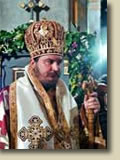 After
services His Holiness Serbian Patriarch Pavle and Bishop Fotije
of Dalmatia held a press conference regarding the chirotonia of
Bishop Gerasim and answered many questions. All present guests
were invited to a festal luncheon in the village of Vrbovsko,
where they were addressed by Bishop Gerasim of Gornji Karlovac;
Bishop Irinej of Backa; the Archbishop and Metropolitan of Rijeka,
Dr. Ivan Devcic; After
services His Holiness Serbian Patriarch Pavle and Bishop Fotije
of Dalmatia held a press conference regarding the chirotonia of
Bishop Gerasim and answered many questions. All present guests
were invited to a festal luncheon in the village of Vrbovsko,
where they were addressed by Bishop Gerasim of Gornji Karlovac;
Bishop Irinej of Backa; the Archbishop and Metropolitan of Rijeka,
Dr. Ivan Devcic; 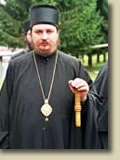 Bishop
Nikolaj of Znepolje; the Croatian Secretary for Religious Communities,
Mr. Franjo Dubrovic; the Serbian Minister for Diaspora, Mr. Vojislav
Vukcevic; Auxiliary Bishop Vlado Kosic; Republika Srpska Minister
for Religions; Mr. Dusan Antelj; and the Hierarchal Exarch of
Plascane, Protopresbyter-Stavrophor Mico Kostic. Bishop
Nikolaj of Znepolje; the Croatian Secretary for Religious Communities,
Mr. Franjo Dubrovic; the Serbian Minister for Diaspora, Mr. Vojislav
Vukcevic; Auxiliary Bishop Vlado Kosic; Republika Srpska Minister
for Religions; Mr. Dusan Antelj; and the Hierarchal Exarch of
Plascane, Protopresbyter-Stavrophor Mico Kostic.
After
the luncheon His Grace Bishop Gerasim invited the Patriarch and
the Hierarchs to visit Karlovac, where he showed them the ruins
of the destroyed Serbian Orthodox Cathedral of St. Nicholas and
the Bishop’s Residence, also in ruins since the wartime destruction
of 1991-92.

2ND
SESSION OF INTERPARLIAMENTARY CONFERENCE FOR HUMAN RIGHTS AND
RELIGIOUS FREEDOMS IN BRUSSELS
The
second session of the Interparliamentary Conference for Human
Rights and Religious Freedoms will be held from August 5-7, 2004
in Brussels, Belgium. Delegates from more than 50 countries are
expected to attend. In 2003 more than 100 delegates from approximately
20 countries gathered at EU headquarters to discuss human rights,
religious freedoms and anti-Semitism. This year’s conference includes
a series of plenary sessions regarding the following topics: international
issues such as terrorism, national security, religious freedoms,
ethics, religion, citizenship, registration of laws relating to
religion, anti-Semitism, human smuggling, abuse within the family,
basic women’s rights, etc. Delegates from Saudi Arabia, Italy,
Turkey, Jordan, Bangladesh, Morocco, Serbia and many other countries
will be discussing these topics. The conference was created in
order to discuss issues related to human rights and religious
freedoms through institutions of law in the belief that these
problems can be addressed before escalating. Representing the
Serbian Orthodox Church at this important gathering will be Hieromonk
Irinej Dobrijevic in the capacity of envoy of the Holy Assembly
of Bishops.

U.S.
MUST STOP ETHNIC CLEANSING IN KOSOVO AND METOHIJA
After
participation in the annual convention of the Serb National Federation
in Pittsburgh, Bishop Artemije returned to Washington D.C. where
he had meetings with representatives of the U.S. Congress and
Senate. In his meetings with Sen. George Voinovich, Congressman
Hyde and other representatives, Bishop Artemije said that after
March pogrom the situation of human rights for the Serb population
remains equally unsatisfactory as before.
“In
fact we can hardly see any improvement, quite on the contrary
- Kosovo Serbs still live in their ghettoes, they don't have basic
access to institutions (schools, medical facilities), employment,
freedom of movement, use of their language etc. Security situation
is very fragile and with organizers of the March riots still free
(and on their positions) a potential for reiterated violence still
exists. The return process has been completely stalled and this
should be one of the crucial standards for further progress in
stabilization. Kosovo Albanian institutions, particularly on the
municipal level, constantly make various kinds of obstructions,
while Kosovo Government complains that they cannot provide any
money for the returns. In this way Albanian-led institutions openly
take part in ethnic cleansing which is completely unacceptable
and must not be tolerated by the West,” the Bishop emphasized.
The
Bishop confirmed that an agreement was reached on June 25 between
the Orthodox Church and the Kosovo provisional authorities to
establish an independent Commission under the auspices of the
Council of Europe that will manage the cultural sites reconstruction
process and urged all parties concerned to push this process forward,
but confirmed that since then no progress has been made.
“While
everywhere in the region we can see that international community
does not reward violence and encourages moderation and respect
of human and religious rights, Kosovo province remains a shameful
exception. It is not only that UN Mission, KFOR and Albanian-led
institutions have tolerated ethnic violence against Serbs for
five years but have also proved to be ineffective to protect Serb
civilians and churches in front of Albanian mob and extremists.
So far no one has openly taken responsibility for these failures
and resigned,” said Bishop Artemije. “UNMIK bears responsibility
for many of the failures but we must not forget that life for
non-Albanians in Kosovo would be far more worse without UNMIK
and KFOR. In fact, I can frankly confirm that no Serbs would stay
to live in such a society tailored only for ethnic Albanians,”
he added.
“In
Kosovo many Albanian extremists believe that the U.S. will tolerate
ethnic cleansing and creation of a new ethnic Albanian state.
The U.S. Administration must finally give them a clear message
that the U.S. will not allow creating of a society based on ethnic
crimes and brutal violation of religious rights. Otherwise the
U.S. policy in the Balkans will prove to be in dramatic discrepancy
with the policy in other parts of the world,” concluded the Bishop
his statement to the media after meeting with the U.S. representatives
on the Capitol Hill. This is Bishop Artemije's third visit to
Washington D.C. this year. In his attempt to bear witness to the
catastrophic situation of human and religious rights in Kosovo,
particularly after the March pogrom Bishop Artemije will visit
the U.S. capital once more before the end of 2004.

RESTORATION
OF DESTROYED CHURCHES AND MONASTERIES IN KOSOVO AND METOHIJA HAS
NOT EVEN BEGUN
On
Thursday, July 23, 2004 Acting Special Representative of the UN
Secretary-General for Kosovo and Metohija Charles Brayshaw told
media that UNMIK had set aside an additional half million euros
in addition to the previously earmarked amount of one million
euros for the restoration of churches and monasteries destroyed
during the March violence.
The
truth, however, is that so far work has not even begun on any
of 30 Orthodox shrines damaged or destroyed during the March pogrom,
let alone on any of the other 11o shrines damaged during the previous
five years of so-called international "peace". It makes
sense to ask what happened to the one million euros provided earlier
for restoration when work has not even begun; if it had, the Diocese
of Raska and Prizren would be the first to know. Even if the entire
sum had been spent on the purpose for which it was intended, for
that matter, it is grossly inadequate to cover the cost of repairing
the damage. Just the damages done during the March pogrom is estimated
at incomparably more.
In
any case, it is with regret that we must conclude that an effort
is being made to create a false public perception that work is
being done on restoring churches and monasteries, which is simply
not the case. Even though senior officials of the international
community have made the restoration of destroyed churches one
of the conditions for Kosovo institutions the task has not been
fulfilled and UNMIK skillfully skirted it by proposing the establishment
of a commission to concern itself with the issue of restoration.
Although more than a month has passed since the signing of an
agreement between the Diocese and UNMIK representatives, nothing
has been done toward the rebuilding of the destroyed shrines.
Precious
Serbian cultural and historical monuments are decaying with each
passing day without even temporary protection from rain and bad
weather. Bogorodica Ljeviska (Holy Virgin of Lyevish) and other
Prizren churches have not even been cleaned and reek of urine
while KFOR has blocked off the locations with wire and protective
tape. The lack of care and interest toward these holy shrines
on the part of appropriate institutions is extremely shocking.

[Serbian
Translation Services]
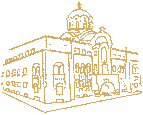
Copyright © 1999-2004 by
The Information Service of
the Serbian Orthodox Church
11000 Belgrade
Kralja Petra I no.5
+381 11 3282 596
e-mail
|

